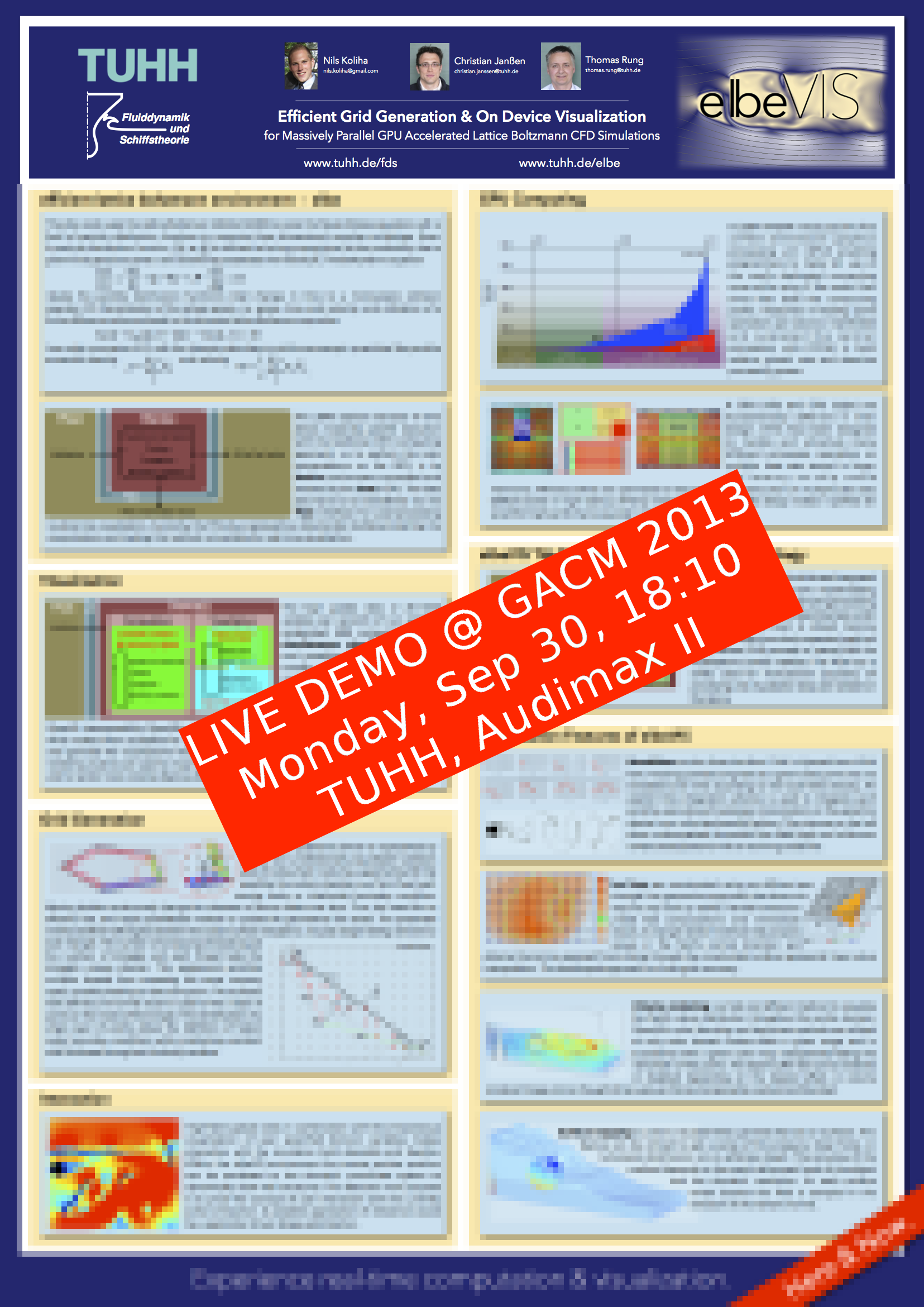Author: Powerkiter
-
elbe team @ GACM 2013
The elbe team will present the latest advances in the field of visualization and fluid-structure interaction at the 5th GACM Colloquium on Computational Mechanics (GACM 2013):
Monday, 15:20 – 15:40:
Nagrelli, Heinrich: GPGPU-accelerated simulation of wave-ship interactions using LBM and a quaternion-based motion modelerTuesday, 13:30 – 13:50
Koliha, Nils: Efficient Grid Generation and On Device Visualization for Massively Parallel GPU Accelerated Lattice Boltzmann CFD SimulationsMonday, 18:10, Poster Session
Koliha, Nils: Efficient Grid Generation and On Device Visualization for Massively Parallel GPU Accelerated Lattice Boltzmann CFD Simulations (Poster/Live Demo)Moreover, this year’s symposium on Fluid Mechanics is organized by Christian Janßen and Thomas Rung (symposium #12, GACM web page). The symposium features 18 talks in four sessions on Hybrid Methods, the Lattice Boltzmann Method, Optimization, and FEM and ACM. It will take place on Tuesday and Wednesday from 10:30 to 12:10 and from 13:30 to 15:10 in building N, room 0.007 (campus map).
-
elbe
During my last year at the Institute for Fluiddynamics and Ship Theory at TUHH, I worked on refactoring, extending and combining my previously written GPGPU codes into one single code framework. The result is
elbe – the efficient lattice boltzmann environment
from Hamburg. It features 1D, 2D and 3D Lattice-Boltzmann kernels for various different physics, from the depth-averaged one-dimensional shallow water equations to three-dimensional multiphase models. elbe has already been used in a couple of B.Sc. and M.Sc. projects and for teaching purposes. Further information on the code, a list of publications publications and a multimedia gallery is now available at
-
Testing the new GeForce GTX Titan
We recently tested the new NVIDIA Kepler boards for our GPGPU flow solver elbe. After initial tests on the Kepler K20 boards were very promising and led to speed-up factors of up to 2.5x (without any code modifications), we decided to purchase the new GeForce GTX Titan board to see if the consumer hardware can keep up with the professional boards. This consumer card features 2688 streaming processors, 6 GB device memory and single- and double-precision compute capability.
Running the elbe code for both 2D/3D and single/double precision calculations, we found a performance of up to 1.5 GNUPS (giga node updates per second), 2.5x more than on our recent Tesla C2075 GPGPUs, for a D2Q9 singlephase LBM calculation.
Further reading:
- http://www.nvidia.de/object/nvidia-kepler-de.html
- http://www.nvidia.de/titan-graphics-card
-
ISOPE Abstracts accepted
An improved two-phase Lattice Boltzmann model for high fluid density ratios: application to wave breaking
Amir Banari, Christian F. Janßen, Stéphan T. Grilli
Dept. Ocean Engineering, University of Rhode Island, USA.Three-dimensional numerical simulation of air-sea interaction with a coupled LB-point-particle approach
Yackar Mauzole, Christian F. Janßen, Stephan T. Grilli, Tetsu Hara
University of Rhode Island, USA.Numerical simulation of long wave propagation and run-up using a Lattice Boltzmann approach on GPGPU hardware
Christian F. Janßen, Stéphan T. Grilli
Dept. Ocean Engineering, University of Rhode Island, USA.Manfred Krafczyk
Technische Universität Braunschweig, Germany.http://www.isope2012.org/
-
OE Seminar Talk Today!
Ocean Engineering seminar talk today, join me:
Modeling of complex free surface flows and wave-structure interactions using the Lattice Boltzman Method, Christian Janssen, PostDoc, Ocean Engineering
